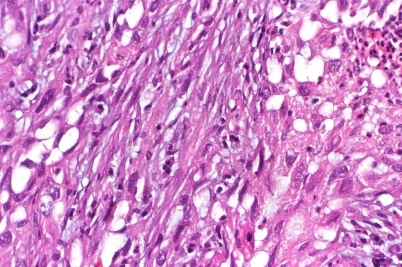Symptoms and Treatment of Sarcomatoid Mesothelioma
Sarcomatoid mesothelioma is a rare diagnosis, caused by exposure to asbestos and accounts for 10% to 20% of all mesothelioma cases. Sarcomatoid cells form from the more common epithelioid cells. It is a cellular type of mesothelioma and may be referred to as fibrous mesothelioma due to its appearance. It forms far more often in the pleura than it does in the peritoneum - around 96% of sarcomatoid cases are pleural mesothelioma.

Mesothelioma forms when asbestos fibres lodge into and irritate mesothelial cells which are epithelial cells along the linings of the lung and abdominal cavities.
Most of the diseased cells will stay as epithelial cells, which is why epithelioid mesothelioma is the most common cell type.
However, some cells may transform into sarcomatoid cells when they become cancerous.
This change occurs due to the epithelial-to-mesenchymal transition, which involves epithelial cells changing into mesenchymal cells, which are part of the body’s connective tissue such as bones and cartilage. Cancerous connective tissue cells are called sarcomas, which is the origin of sarcomatoid mesothelioma.
There are several defining characteristics that can help identify sarcomatoid cells:
- An oval, elongated, spindle shape with a large nucleus
- Multiple nuclei in some cells and are hard to distinguish from healthy tissue
- Unstructured formation in fibrous nodes or lesions
- Distant cell formation that is faster to metastasize than other cell types
The nature of how these cells spread makes sarcomatoid mesothelioma difficult to treat - The cells do not form in regular patterns like epithelioid cells, rather they metastasize quickly and proliferate through soft tissue and are difficult to locate and remove.
Sarcomatoid Mesothelioma Symptoms
Symptoms may take anything from 10 to 50 years to develop. Symptoms of mesothelioma may mimic those caused by other illnesses, which is one of the reasons why early detection is difficult.
Symptoms of sarcomatoid mesothelioma include:
- Shortness of breath / breathing difficulties
- Chest, abdominal or lower back pain
- Persistent cough / Prolonged hoarseness
- Pleural effusion (fluid build-up)
- Nausea and vomiting
- Decreaed appetite/ weight loss / anorexia
- Low blood oxygen levels
- Anemia (low iron)
Sarcomatoid patients may experience worsening symptoms earlier than patients with epithelioid or biphasic cell types.
Diagnosis of Sarcomatoid Mesothelioma
Sarcomatoid mesothelioma is often difficult to accurately diagnose because it is rare and it mimics other conditions with cells looking similar to benign tissue.
Diagnosis will usually start with an X-ray and CT scan to identify excess fluid in the chest cavity and the presence of tumours. If cancer is suspected, doctors may order a blood test to identifies biomarkers that can differentiate mesothelioma from other conditions. In order for doctors to get a definitive diagnosis, they will perform a fluid extraction or tissue biopsy - a small sample of the tumour for identification under a microscope.
The cell type can be determined through analyses of the sample, such as immunohistochemistry - a staining method that uses antibodies to isolate antigens or proteins in the tissue sample. Proteins are markers to distinguish each cell type to diagnose patients with this rare form of mesothelioma.
Immunohistochemical proteins for diagnosing sarcomatoid mesothelioma include:
- Podoplanin (D2-40)
- Pancytokeratin
- Calretinin
- GLUT1
The long latency period of mesothelioma, along with its aggressive behavior once the tumours form, can lead to a misdiagnosis. Doctors may attribute the symptoms and test results to other illnesses such as:
- Fibrous pleurisy / Pleuritis
- Localised fibrous tumours
- Fibrosarcoma / Sarcoma
- Non-Hodgkin’s lymphoma
- Pleural liposarcoma
- Sarcomatoid carcinoma
Prognosis For Sarcomatoid Mesothelioma Patients
The prognosis for sarcomatoid mesothelioma is not as favourable as the other cell types. The median survival rate for patients who don’t receive treatment is less than 6 months. Prognosis will also depend on the type of mesothelioma and stage at diagnosis, as well as the patient’s age, gender and overall health.
If the disease is diagnosed early enough, and the patient meets the treatment criteria then post-operative life expectancy can increase to an average of 11.2 months. The location of the mesothelioma also affects prognosis with patients diagnosed with peritoneal mesothelioma often having a better rate of survival than those with the more common pleural mesothelioma.
In one study, Sarcomatoid pleural mesothelioma patients survived for an average of 8 months while Sarcomatoid peritoneal mesothelioma patients survived for an average of 13 months.
Treatment Options of Sarcomatoid Mesothelioma
Surgery
The location and stage of the sarcomatoid mesothelioma will determine the treatment options, which include surgery, chemotherapy and radiation therapy. Surgery may not be a viable option as Sarcomatoid mesothelioma spreads quickly throughout the body and the cancer has a tendency to return relatively soon, even after extensive surgery. Also sarcomatoid tumours are rigid, often spread over large areas and can grow into the chest wall.
On the rare occasions that surgery is a treatment option then sarcomatoid mesothelioma surgeries include extrapleural pneumonectomy (which removes the affected lung) and pleurectomy with decortication (which spares the nearby lung). Peritoneal mesothelioma surgery is usualy cytoreduction with heated intraperitoneal chemotherapy.
Chemotherapy
Chemotherapy is the preferred treatment for sarcomatoid mesothelioma with research suggesting the treatment may extend survival in some cases. Though other studies show Sarcomatoid cells can be resistant to chemotherapy. The standard chemotherapy for treating pleural mesothelioma is a combination of Alimta (pemetrexed) and cisplatin.
Immunotherapy
Immunotherapy treatments have also shown promise in clinical trials with research suggesting it may be an effective option for patients with sarcomatoid mesothelioma who have been treated with chemotherapy. In fact, there is evidence to indicate that sarcomatoid mesothelioma may be more responsive to immunotherapy than other cell types.
Radiation Therapy
Radiation is another treatment option, although it’s often used as a second-line treatment either before or after surgery. It may be used as a palliative treatment to lessen symptoms and improve quality of life.
For any questions on this or claiming compensation for sarcomatoid mesothelioma, please call on the number below and ask for Kathy or Warren













